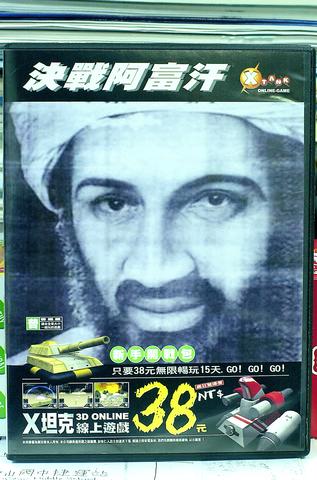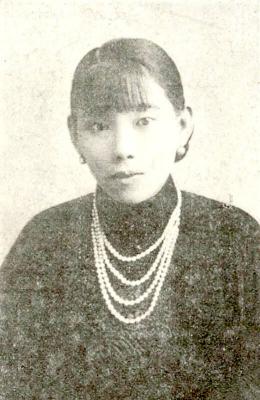For all the CIA knows, Osama bin Laden may be sipping cocktails in Tahiti. But in the virtual world of cyberspace, he's nowhere but in your crosshairs, thanks to some enterprising software programmers.
On Sept. 12, the managers of INSREA, a Taiwanese game software firm, convened a hasty meeting at their downtown Taipei office to discuss how to make the events of the previous day into a gripping video game.

PHOTO: TAIPEI TIMES
They decided to include an Afghanistan-looking desert map in the Korean-made online computer game X-Tank, which INSREA distributes in Taiwan, Hong Kong and China. The end product is Final Battle Afghanistan X-Tank, the game packaged with the black-and-white mug of bin Laden which is available for NT$38 at 7-11s and software stores around the country.
"We're the first company to make software for a game specifically themed on the conflict in Afghanistan," said Hu Long-yun (
In fact, INSREA is the first company to create a game themed on the Sept. 11 attacks for the open market. Basic Sept. 11-themed games were available online within days of the attacks. But, unlike X-Tank, these early games were mostly non-commercial knock-offs of old well-known games like Asteroids or Centipede with George W. Bush and bin Laden pasted onto the game's protagonist and antagonist characters.
X-Tank has 12 different maps, with settings that include a cluttered desk, a chessboard, a computer's circuit board, the Champs Elysees, and now in the Final Battle Afghanistan version, an entire map modeled after Afghan battlefields. The company had drawn up plans to include a map of Iraq, but because the US had not gone after Saddam Hussein when the game went to press, the Iraq levels were shelved.
In the game, players rush around the maps commanding various shapes and colors of tanks and blow each other up.
Only half jokingly, Hu said, "We wish bin Laden would contact us so we could give him a copy of the game." It's unlikely, however, that bin Laden would get a rush out of Final Battle Afghanistan. The graphics are dull, the action sleep-inducing and the Afghan map unconvincing. But the game does have novelty value as the first, visibly rushed, software product based on Sept. 11.
Another commercially produced game themed on the Sept. 11 attacks is the 1980s-style hand-held Laden vs USA. This game, even more than X-Tank, can only be appreciated for its novelty value and the eerie packaging featuring the imploding Twin Towers.
Laden vs USA is a monumentally boring game, but its value as pure kitsch may be a turn-on for collectors of such items.
The game's soundtrack is an attempt at a Middle Eastern melody, but the sound is so high-pitched and grating it's almost impossible to listen beyond five notes. Adding a touch of surrealism, Deck the Halls or London Bridge plays when you win a round.
The game has two versions, one that pits bin Laden against Bush in a boxing match and a version in which a submarine shoots down fighter jets screaming around the tiny screen.
Both versions require some imagination on the part of the player. The bin Laden and Bush characters look nothing like their real-life likenesses in the boxing one and the submarine in the second version is hilariously out of place in the context of Afghanistan, which the manufacturers apparently forgot is a landlocked country. Made by Panyu Gaoming Electronic of Guangzhou, China, Laden vs USA is now out of production for reasons that a company spokeswoman refused to clarify. She also declined to answer what the submarine is doing in Afghanistan and whether the player in the boxing version controls bin Laden or Bush.
But then, if the details were all correct, Laden vs USA and X-Tank would lose a lot of their kitsch value and would just be bad games.

Many people noticed the flood of pro-China propaganda across a number of venues in recent weeks that looks like a coordinated assault on US Taiwan policy. It does look like an effort intended to influence the US before the meeting between US President Donald Trump and Chinese dictator Xi Jinping (習近平) over the weekend. Jennifer Kavanagh’s piece in the New York Times in September appears to be the opening strike of the current campaign. She followed up last week in the Lowy Interpreter, blaming the US for causing the PRC to escalate in the Philippines and Taiwan, saying that as

US President Donald Trump may have hoped for an impromptu talk with his old friend Kim Jong-un during a recent trip to Asia, but analysts say the increasingly emboldened North Korean despot had few good reasons to join the photo-op. Trump sent repeated overtures to Kim during his barnstorming tour of Asia, saying he was “100 percent” open to a meeting and even bucking decades of US policy by conceding that North Korea was “sort of a nuclear power.” But Pyongyang kept mum on the invitation, instead firing off missiles and sending its foreign minister to Russia and Belarus, with whom it

The Chinese Communist Party (CCP) has a dystopian, radical and dangerous conception of itself. Few are aware of this very fundamental difference between how they view power and how the rest of the world does. Even those of us who have lived in China sometimes fall back into the trap of viewing it through the lens of the power relationships common throughout the rest of the world, instead of understanding the CCP as it conceives of itself. Broadly speaking, the concepts of the people, race, culture, civilization, nation, government and religion are separate, though often overlapping and intertwined. A government

Nov. 3 to Nov. 9 In 1925, 18-year-old Huang Chin-chuan (黃金川) penned the following words: “When will the day of women’s equal rights arrive, so that my talents won’t drift away in the eastern stream?” These were the closing lines to her poem “Female Student” (女學生), which expressed her unwillingness to be confined to traditional female roles and her desire to study and explore the world. Born to a wealthy family on Nov. 5, 1907, Huang was able to study in Japan — a rare privilege for women in her time — and even made a name for herself in the